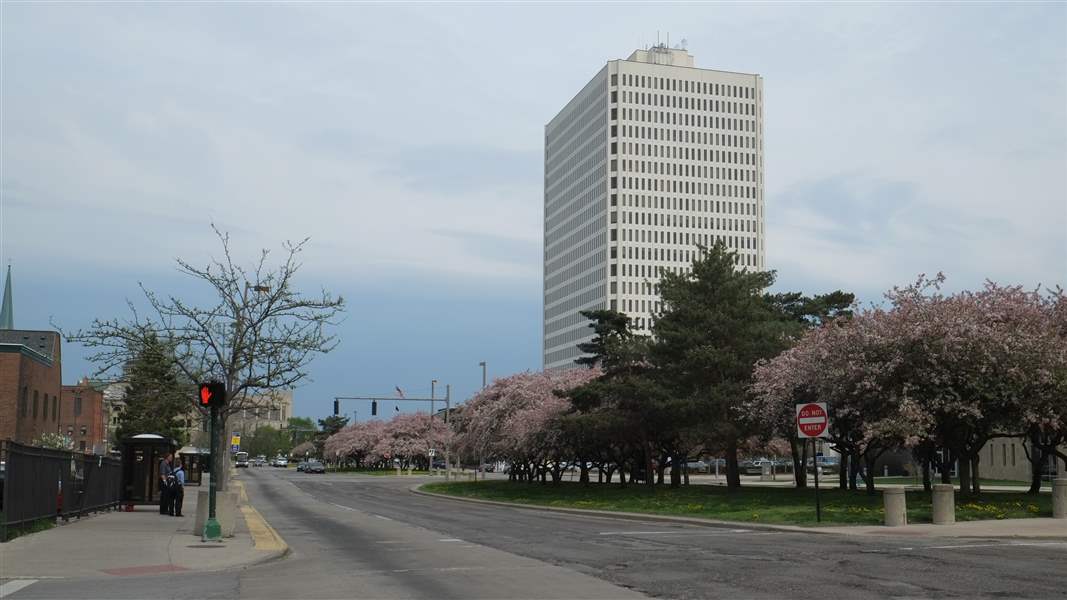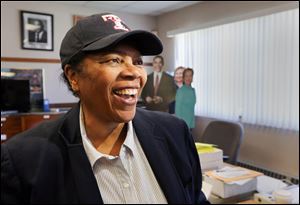
Mayor: Toledo could have $6 million more than expected
Health care savings, income taxes, handheld speed camera tickets all factors
5/30/2017
One Government Center in downtown Toledo.
THE BLADE
Buy This Image
The city of Toledo could have at least $6 million more than expected in its coffers this year, The Blade has learned.
Mayor Hicks-Hudson said the city has several million dollars extra from lower-than-expected health care costs; reduced workman compensation costs; greater-than-anticipated income taxes, and more money than expected from tickets issued with handheld speed cameras devices.

Mayor Paula Hicks-Hudson says the City of Toledo may have as much as $8 million more than it was expecting in its coffers this year.
"What we have is some good news," the mayor told The Blade. "And the good news is because of ... the handheld speed cameras and some other revenue things that are happening."
The Democratic mayor — who is seeking reelection this year against challengers Wade Kapszukiewicz, also a Democrat and the Lucas County treasurer, and Republican District Councilman Tom Waniewski — wanted to delay announcing the budget improvements at least until the numbers are audited and included in the city's comprehensive annual financial review.
"It could be $8 million," she said.
Mayor Hicks-Hudson said she planned to hire new police officers one month earlier this year, from August to July, because of the extra revenue.
“We are also maintaining the controls of hiring, not a freeze,” she said.
Mayor Hicks-Hudson stressed the city's general fund would not have a surplus since it is balanced again this year by transferring millions from the city capital improvement fund. All three mayoral candidates have committed to reducing or stopping that transfer, which would free up more money for road repair. The 2017 general fund budget requires $11,067,300 be taken from the capital improvement fund.
The mayor budgeted $2.3 million from fines this year generated by handheld speed cameras, but it collected $1,377,640 by the end of April. The city will collect more than $4.1 million by the end of 2017 if the same numbers of speeders are nailed with those tickets monthly.
Finance Director George Sarantou also refused to call the money a general fund surplus since the city took millions from its capital improvement fund to pay for daily operations.
"Once we have a final number, the mayor wants to do more residential street repaving," Mr. Sarantou said.
The city budgeted $7 million for residential street repaving this year, up from zero last year.
Mr. Sarantou said the city could have millions or so more than expected in part because of the improving economy that has increased the payroll tax collections and the other factors. The city expects $173.65 million this year from the 2.25 percent income tax. The city had $52,733,860 by the end of April, the most recent figures available.
The saving from health insurance cannot be counted on annually, the officials said.
The city is self insured and had lower health care costs in 2016 than expected, Mr. Sarantou said.
That saved the city $1.3 million, he said.
Mr. Sarantou warned the city could have higher health insurance this year.
"We don't say we are going to get lucky twice in a row," he said. "We don't know who is going to have a coronary; who is going to have major surgery."
Workman compensation costs are down and the state put the city is a better category because of reduced claims.
That saved the city another $2.3 million plus there will be a premium refund to Toledo of about $2.6 million.
“When they did the analysis, the claims were less than what they thought they were going to be,” Mr. Sarantou said. “So they said to us 'we are reducing your costs by $2.3 [million.]' That is a benefit to the 2016 numbers.”
The $2.6 million premium refund is a benefit to the city's 2017 but it must be split among funds.
“A little more than 50 percent of that [$2.6 million] will benefit the general fund,” Mr. Sarantou said. “The rest will go to [the department of public utilities] and other funds.”
The figures add up to about $8 million if the handheld speed cameras actually bring in $4.1 million. Collecting more than the $173.65 million budgeted for incomes taxes would add to that figure and cutting spending would also help.
City spokesman Janet Schroeder said spending this year is “right where it should be.”
Mayor Hicks-Hudson and Mr. Sarantou acknowledged that the lower workman compensation cost is in part because of outsourcing trash collection to a private company, which was done under the administration of former Mayor Mike Bell.
City refuse collectors suffered some of the highest percentages of on-the-job injuries compared to other city departments, she said.
“We went out of the trash collection business … back in 2010 and so we are being told workman's comp over the ten-year period from 2010 to 2020, we will see the most savings,” Mr. Sarantou said. “Most of our huge claims were related to the trash collectors because they [were] lifting heavy cans.”
Mr. Bell said he knew it would be much more efficient for taxpayers to privatize refuse collection.
“When you reduce the number of people you have on board, you are naturally going to reduce the number of injuries,” Mr. Bell said. “We found a union company that was willing to take all of our workers. Some went with the company and some did not.”
Mr. Kapszukiewicz said this morning said he would hire 40 police officers a year, using the extra money.
“I believe the city's revenues are higher than expected from income tax receipts and speeding tickets and the city's costs are lower-than-expected from health insurance payouts and workman compensation claims,” he said. “Because of these factors, the city has between $5 and $8 million available for police, and roads, and water, and to balance our budget.”
Mr. Waniewski said he had received hints the city would have more money this year.
“The one thing about politicians, whenever they find new money, they want to start spending and I would just as soon be careful about that,” he said. “We need to build up our budget stabilization fund and I would look at repairing streets as well. When Wade talks about hiring a police class, well no kidding. We all want more police.”
Twenty-five new police officers graduated from the city's police academy on May 19.
“We started that with a class of 40 and we ended up with 25,” Mr. Waniewski said. “We can do all the 40 classes we want but we have to make sure we are recruiting the best.”
That class actually started with 31 recruits in November 2016 but six dropped out before the end of the six-month training program.
Contact Ignazio Messina at: imessina@theblade.com or 419-724-6171 or on Twitter @IgnazioMessina.